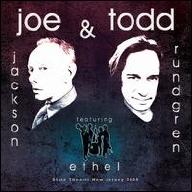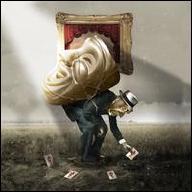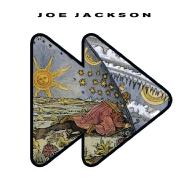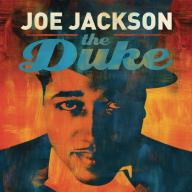He was born David Ian Jackson on August 11, 1954 in Burton-upon-Trent, Staffordshire, England. His parents met when his father was in the Navy and his mother was working in her family's pub in Portsmouth on the south coast of England. They initially settled in his father's hometown, Swadlincote, on the border of Staffordshire and Derbyshire, but when Jackson was a year old, they moved back to his mother's hometown, and he was raised in Portsmouth and nearby Gosport. His father, Ronald Jackson, became a plasterer. Growing up in working-class poverty, Jackson struggled with asthma, first diagnosed when he was three and producing attacks that lasted into his twenties. Prevented from playing sports, he turned to books and eventually music. At 11, he began taking violin lessons, later studying timpani and oboe at school. His parents got him a secondhand piano when he was in his early teens, and he began taking lessons, soon deciding that he wanted to be a composer when he grew up. He played percussion in a citywide student orchestra, but his social milieu was more accepting of popular music than the classics. Becoming interested in jazz, Jackson formed a trio and, at the age of 16, began playing piano in a pub, his first professional gig.
By the early '70s, Jackson became a fan of progressive rock, notably by such British groups as Soft Machine. Meanwhile, in 1972, he passed an advanced "S" level exam in music that earned him a grant to study music, and he was accepted at the Royal Academy of Music in London. Rather than moving to the city, he spent his grant money on equipment and commuted several days a week to attend classes while continuing to live at home and play pop music locally. He switched from writing classical compositions to pop songs and joined an established band called the Misty Set, where he sang his first lead vocal on-stage. He moved to another established band called Edward Bear (not to be confused with the Canadian band of the same name); deciding that he resembled the title character on a television puppet show called Joe 90, his bandmates began calling him "Joe," and it stuck. After six months, the two principals in Edward Bear decided to retire from music, and with their permission Jackson took over the name and brought in a couple of his friends, lead singer/guitarist Mark Andrews (later of Mark Andrews the Gents) and bassist Graham Maby.
Jackson continued to attend the Royal Academy, where he studied composition, orchestration, and piano while majoring in percussion. He also occasionally played piano in the National Youth Jazz Orchestra. Jackson graduated from the academy after three years in 1975. By then, Edward Bear were forced to change their name to Edwin Bear because of the more successful Canadian band, and then became known as Arms Legs. Arms Legs were attracting more attention and acquired management, who in turn signed the band to MAM Records. In April 1976, MAM released the first Arms Legs single, with Andrews' "Janie" on the A-side and Jackson's "She'll Surprise You" on the flip. After subsequent singles failed to chart, Jackson quit the band in October 1976 to become the pianist and musical director at the Playboy Club in Portsmouth, determined to save enough money to record his own album and release it himself. In August 1977, he played his first gigs as the leader of the Joe Jackson Band, singing and playing keyboards, backed by Andrews (sitting in temporarily and soon replaced by Gary Sanford), Maby, and drummer Dave Houghton. At the same time, he quit the Playboy Club job to become pianist/musical director for a cabaret act, Koffee 'n' Kream, who were beginning a national tour in the wake of their triumph on the TV amateur show Opportunity Knocks.
Jackson toured with Koffee 'n' Kream from the fall of 1977 to the spring of 1978, and the money he made enabled him to move to London and continue recording his album in a Portsmouth studio. He began shopping demo tapes and was heard by American producer David Kershenbaum, who was scouting talent on behalf of AM Records. He arranged for Jackson to be signed to AM in August 1978, after which they immediately re-recorded Jackson's album. It was completed quickly, and at the end of the month the Joe Jackson Band embarked on an extensive national tour. Despite his classical education and background playing many types of pop music in pubs and clubs, Jackson had become genuinely enamored of the punk/new wave movement of the late '70s in England, especially the energy and simplicity of the music and the outspoken tone of the lyrics. Jackson had no trouble incorporating these elements into his own music, and if he was using the new wave label as a flag of convenience, the style nevertheless was a good fit for him.
In October 1978, AM released the first Joe Jackson single, "Is She Really Going Out with Him?," a rhythmic ballad in which the singer ponders why "pretty women" are attracted to "gorillas" and worries about his own inadequacy. The record initially failed to chart, but Jackson and his band continued to tour the U.K. and began to attract press attention. Look Sharp!, his debut album, followed in January 1979, and in March, it broke into the charts, eventually peaking at the bottom of the Top 40. The same month, AM released the album in the U.S., and it quickly charted, reaching the Top 20 after "Is She Really Going Out with Him?" was released as a single in May and became a Top 40 hit; in September, the LP was certified gold in the U.S. In the U.K., "Is She Really Going Out with Him?" was re-released in July and charted in August, making the Top 20. Jackson was nominated for a 1979 Grammy Award for Best Rock Vocal Performance, Male, for the single.
Jackson toured more or less continually, but had found the time and inspiration to craft a quick follow-up to Look Sharp!, and his second LP, I'm the Man, was released in October 1979. That was a little too soon for the U.S. market, where Look Sharp! had not yet exhausted its run, and while the album made the Top 40, it was a relative sales disappointment, with the single "It's Different for Girls" failing to enter the Hot 100. The story was different in the U.K., where I'm the Man made the Top 20 and "It's Different for Girls" reached the Top Five. Like other punk/new wave acts, Jackson used reggae rhythms on occasion, notably on "Fools in Love" on Look Sharp! and "Geraldine and John" on I'm the Man. In May, he released an EP in the U.K. including a cover of Jimmy Cliff's reggae standard "The Harder They Come." In acknowledgment of his group's importance to his sound, the disc was billed to the Joe Jackson Band.
Beat Crazy, released in October 1980, was also credited to the Joe Jackson Band, and found him digging significantly deeper into his reggae and ska influences. It was a relative disappointment commercially, peaking in the 40s in both the U.S. and U.K., with its singles failing to chart. The Joe Jackson Band played a month-long tour from October to November in the U.K., followed by a month in Europe from November to December, but played no dates in the United States. According to Jackson, the band split up following the European dates because Houghton no longer wanted to tour. Sanford became a session musician, while Maby stuck with Jackson.
Jackson, in ill health following more than two years of continual touring, retreated to his family home, where he immersed himself in the jump blues of '40s star Louis Jordan. He organized a new band in the style of Jordan's Tympany 5 featuring three horn players (Pete Thomas on alto saxophone, Raul Oliveria on trumpet, and David Bitelli on tenor saxophone and clarinet) along with pianist Nick Weldon and drummer Larry Tolfree, plus Maby and Jackson himself, who played vibes and sang. The group played a collection of swing and jump blues standards, and the resulting album, 1981's Jumpin' Jive, was a hit in Britain, where it reached the Top 20. In the U.S., the album struggled to make its way into the Top 50, though it would anticipate the neo-swing movement of the late '90s.
Jackson went through more personal changes over the next year. He and his wife divorced, and he moved to New York City, where he began to explore new musical directions, particularly salsa and the classic songwriting styles of Gershwin and Cole Porter. The result was Night and Day, released in June 1982, Jackson's first album to put his keyboard playing at the center of his music. Jackson traded new wave rock for a catchy pop-jazz-salsa-dance hybrid, and "Steppin' Out" became a multi-format hit, earning airplay on album-oriented rock radio before spreading to the pop and adult contemporary charts, placing in the Top Ten all around and eventually earning Grammy nominations for Record of the Year and Best Pop Vocal Performance, Male. With that stimulus, the album reached the Top Ten and went gold, spawning a second Top 20 single in "Breaking Us in Two."
Jackson finished the Night and Day tour in May 1983. He had been asked to contribute a song to Mike's Murder, a film written and directed by James Bridges and starring Debra Winger. Jackson ended up writing a handful of songs and a few instrumental pieces that were released on a soundtrack album in September. Unfortunately, due to a dispute between Bridges and the studio that had financed the film, the movie did not open until March 1984, by which time it had a score by John Barry and only a little of Jackson's music remaining. The film was a bust at the box office, but the orphaned soundtrack album managed to get into the Top 100 and spawned a chart single in the Jackson composition "Memphis," while "Breakdown" earned a Grammy nomination for Best Pop Instrumental Performance.
Jackson returned in March 1984 with Body Soul, a follow-up to Night and Day in style, but with a bit more of an R&B tilt, and it was another commercial success, reaching the Top 20 and spawning a Top 20 single in "You Can't Get What You Want ('Til You Know What You Want)." After the four-month Body Soul world tour concluded in July 1984, Jackson retreated; he later wrote that the tour had been "the hardest I ever did; it came too soon after the last one, and by the end of it I was so burned out I swore I'd never tour again." He re-emerged after 18 months in January 1986 for a series of live recording sessions at the Roundabout Theatre in New York. Audiences were invited to attend, but instructed to hold their applause as the performances were cut direct to two-track tape. The resulting album, Big World, released in March 1986, had a one-hour running time, making it an ideal length for the new CD format, though it had to be pressed on two LPs with the fourth side left blank. Jackson undertook another extensive tour lasting eight months, and the album spent six months in the charts, but only peaked in the Top 40.
In the winter of 1985, Jackson was commissioned to write a 20-minute score for a Japanese film, Shijin No Ie (House of the Poet), and the orchestral piece was recorded with the Tokyo Symphony Orchestra. He adapted it into "Symphony in One Movement" and added a few other instrumental pieces to create his next album, 1987's Will Power, his first disc to reflect his classical background. Jackson's increasing desire to include classical elements in his popular work and to issue "serious" compositions tended to put him in a no man's land, where rock critics for the most part preferred that he stick to pop-based music, while classical critics simply ignored him.
While staying off the road, Jackson had two albums released in 1988. In May, he issued the double-disc set Live 1980/86, which reached the Top 100. In August came his swing-styled soundtrack to the Francis Ford Coppola film Tucker: The Man and His Dream; the album earned a Grammy nomination for Best Album of Original Instrumental Background Score Written for a Motion Picture or TV. His next LP, released in April 1989, was Blaze of Glory, another modest seller that peaked only in the Top 100 despite radio play for the single "Nineteen Forever." Jackson, who felt the album was one of his best efforts and toured extensively to support it, was disappointed with both the commercial reaction and his record company's lack of support. He parted ways with AM, which promptly released the 1990 compilation Steppin' Out: The Very Best of Joe Jackson, a Top Ten hit in the U.K.
Jackson wrote his third movie score for 1991's Queens Logic; no soundtrack album was issued. Signing to Virgin Records, he released his next album, Laughter Lust, in April 1991. Here, he expressed some of his frustration with the record business in the appropriately catchy, '60s-styled "Hit Single," while the socially conscious "Obvious Song" and a percussion-filled cover of Fleetwood Mac's "Oh Well" attracted radio attention. Another world tour stretched from May to September, after which Jackson was not heard from on record for three years. In the interim, he wrote music for two movies, the interactive film I'm Your Man (1992) and the feature Three of Hearts (1993), neither of which produced soundtrack albums featuring his music. He reappeared in record stores in October 1994 with Night Music, a low-key album that attempted to fuse his pop and classical styles, including instrumentals and guest vocals by Máire Brennan of Clannad. Jackson next left Virgin and signed to Sony Classical, a label more accepting of his musical ambitions. In September 1997, Sony released Heaven Hell, a song cycle depicting the seven deadly sins, billed to Joe Jackson Friends; the friends included folk-pop vocalists Jane Siberry and Suzanne Vega, and opera singer Dawn Upshaw. The album reached number three in Billboard's Classical Crossover chart, and a tour ran from November to April 1998.
Jackson worked on two projects in the late '90s, both of which appeared in October 1999. Sony Classical issued his Symphony No. 1, which was played not by an orchestra, but by a band of jazz and rock musicians including guitarist Steve Vai and trumpeter Terence Blanchard, and it won the 2000 Grammy Award for Best Pop Instrumental Album. And publishers Public Affairs came out with Jackson's book, A Cure for Gravity: A Musical Pilgrimage, in which he wrote about his love of music and recounted his life from his birth up to the point of his emergence as a public figure in the late '70s. Bringing his story up to date, he wrote, "So I'm still making music, no longer a pop star -- if I ever really was -- but just a composer, which is what I wanted to be in the first place."
Having released only semi-classical works on his prior three recordings, Jackson was thought to have abandoned pop/rock music completely, but the early years of the 21st century found him in a flurry of activity, much of it returning him to the pop realm. In June 2000, Sony Classical issued Summer in the City: Live in New York, an album drawn from an August 1999 concert that featured him playing piano and singing, backed only by Maby and drummer Gary Burke, performing some of his old songs along with covers of tunes by the Lovin' Spoonful, Duke Ellington, and the Beatles. Four months later came Night and Day II, a new set of songs in the spirit of his most popular recording. Touring to promote the album in Europe and North America from November to April 2001, Jackson recorded the concert CD Two Rainy Nights: Live in Seattle Portland, released in January 2002 on his own Great Big Island label. (The album was reissued by Koch in 2004.)
Later in 2002, Jackson reunited with the original members of the Joe Jackson Band -- Graham Maby, Gary Sanford, and Dave Houghton -- to record a new studio album, Volume 4, released by Restless/Rykodisc in March 2003. They next embarked on a world tour running through September 2003 that resulted in the live album Afterlife, issued in March 2004. Meanwhile, his recording of "Steppin' Out" was being used in a television commercial for Lincoln Mercury automobiles, and he scored the film The Greatest Game Ever Played for a 2005 release. Jackson released a new studio album, Rain, in 2008, followed by 2011's Live Music: Europe 2010, which was recorded live in Europe during his 2010 Joe Jackson Trio tour with Dave Houghton and Graham Maby.
In 2012, Jackson released the Duke Ellington tribute album The Duke. Though a long-avowed fan of the legendary jazz pianist and bandleader, Jackson didn't want his tribute to follow the standard reverent approach, and instead he filtered these timeless compositions through various unexpected rhythms, arrangements, and musical pairings, including a duet with punk icon Iggy Pop on "It Don't Mean a Thing (If It Ain't Got That Swing)." The year 2015 brought another ambitious project from Jackson; the album Fast Forward found him recording in four cities with four different sets of musicians, with each capturing a different aspect of the songwriter's musical personality. As part of Record Store Day in 2017, Jackson released the single "Fools in Love" backed by "Music to Watch Girls By," which were unreleased live recordings with his trio from 2010. Joe Jackson and his band -- guitarist Teddy Kumpel, bassist Graham Maby, and drummer Doug Yowell -- toured the United States in mid-2018. After the final show of the tour, in Boise, Idaho, Jackson and his accompanists immediately entered Boise's Tonic Room Recording Studio, wanting to begin work on their next album while they were still sharp from regular gigging. The resulting album, Fool, was released in January 2019. ~ William Ruhlmann & Mark Deming, Rovi


















